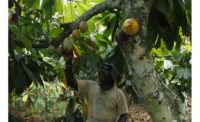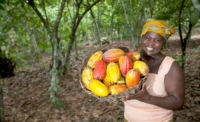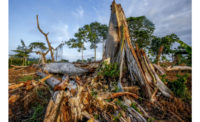Fairtrade cocoa farmers in West Africa are investing in their farms, crop infrastructure and communities, but they need deeper, long-term partnerships to drive change. So concludes a new report “Fairtrade Cocoa in West Africa,” released today by Fairtrade International and Fairtrade Africa.
Report findings reveal that Fairtrade-certified cocoa farmer organizations chose to spend 36 percent of their Fairtrade premiums on projects to increase the productivity of members’ farms and the quality of their cocoa – well above Fairtrade International’s suggested 25 percent minimum. The certifying organizations provide defined premiums of $200 per ton paid directly to farmers' organizations, which are managed at the sole discretion of farmers via their general assembly.
For example, the ECOOKIM cooperative tackled the issue of cocoa mold by investing its Fairtrade premiums for member training on Good Agricultural Practices, which included fermentation and drying processes in storage warehouses and upgraded drying racks. As a result, nine of 10 members now deliver high quality cocoa for the international market.
“When farmers are strong and organized, when we have income and investment, we solve problems,” says Chief Adam Tampuri, chairman of Fairtrade Africa. Report statistics bear out Tampuri’s remarks. Farmers’ organizations spent 21 percent on other collective projects, including community improvements, direct farmer benefits, and cooperative strengthening. The CANN cooperative rebuilt two primary schools that had been lying in ruins, enabling 200 students to attend one school alone.
Finally, Fairtrade cocoa farmers spent 43 percent on cash payments to members. This is nearly two and a half times the Fairtrade average, highlighting the high levels of poverty in West African cocoa-growing communities.
Despite the successes of these Fairtrade farmers, there are still many challenges, the report emphasizes.
“We need more long-term agreements for sourcing,” says Mamadou Savane, sustainability manager for the ECOOKIM cooperative. “Every year we wait to see how the sales for the season will turn out and this makes it difficult to plan well, to ensure consistent delivery of programs for our members and to make continuous improvements. We want to work in long-term partnership with our end-clients and have them actively participate in our development path."
Fairtrade certifies about 140,000 cocoa farmers in West Africa, working with some of the smallest and most disadvantaged cocoa farmers in the region. The farmer’s plot size averages 2.6 hectares, which makes them one of the smallest plotholders in the region.
Nine out of 10 West African Fairtrade cocoa farmers are in Ghana and Côte d’Ivoire. The rest are in Sierra Leone, Cameroon, Togo, and Sâo Tomé and Príncipe. To date, West African farmer organizations have sold an average of 36 percent of their cocoa on Fairtrade terms (amongst those that were Fairtrade-certified and eligible to make Fairtrade sales during the full 2012–13 reporting period ).





